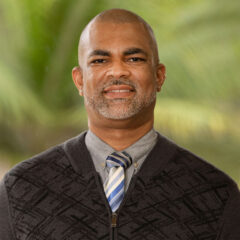Felix Rivera-Mariani
Associate Professor

Contact
| [email protected] | |
| Phone | +1 561-237-7051 |
| Department | College of Arts and Sciences |
| Location | Trinity Residence Hall Assaf 107 |
Professional profile
Dr. Felix E. Rivera-Mariani is an associate professor within the College of Arts and Sciences, where he teaches chemistry, biochemistry and immunology special topics. He earned a B.S. in biology and a minor in chemistry at Southeastern Louisiana University, where he was recruited via a baseball scholarship. After completing his bachelor's degree, he worked briefly in the private sector before seeking a Ph.D. in microbiology at the School of Medicine at the University of Puerto Rico. During his Ph.D. studies, he characterized endemic allergens in the atmosphere of Puerto Rico that contributed to the incidence of chronic allergic respiratory diseases. Upon completing his Ph.D., Rivera-Mariani was recruited to a T32 postdoctoral fellowship at the School of Public Health of the Johns Hopkins University to develop and implement human-based immunological approaches to identify and characterize respiratory health risks in inner-city environments. As a postdoc, he leveraged his research projects to build a strong interest and begin his trajectory as a mentor to the next generation of future scientists, particularly those from minority and underrepresented backgrounds. Rivera-Mariani further developed into an interdisciplinary scientist with training in data sciences (including genomic data sciences), bioinformatics, and systems biology from Johns Hopkins University, University of California-San Diego and Icahn School of Medicine at Mt. Sinai.
Before joining Lynn University, Rivera-Mariani was the lead scientist at the University of Miami site of a multi-center project, Research on the Epidemiology of SARS-CoV-2 among Essential Response Personnel (RECOVER). Prior to the University of Miami, Rivera-Mariani was an assistant professor within the College of Biomedical Sciences at Larkin University, where he taught biochemistry, immunology and molecular genetics, and helped develop curricula within the M.S. in biomedical sciences program. At Larkin University, Rivera-Mariani was also a principal investigator of extramurally funded projects, including projects to study the respiratory health impact of Hurricane Maria in Puerto Rico.
Currently, Rivera-Mariani's research interfaces biochemistry, microbiology, immunology, environmental health and computational approaches to identify biomarkers that can characterize adverse respiratory health risks, including exposure to pollutants from different chemical origins. Ongoing projects include collaborative efforts to characterize endemic atmospheric pollutants and identify their relationship with the incidence of emerging (e.g., COVID-19, RSV, Flu) and chronic respiratory diseases (allergy, asthma, COPD) in tropical and semi-tropical regions. His research and mentoring have led him to consulting opportunities in the private sector and to ad-hoc appointments and standing member appointments to study sessions within the National Institute of Health. He is also an active member of scientific organizations, including the American Academy of Allergy, Asthma, and Immunology, the Society of Toxicology, the American Association of Immunologists, the American Society of Microbiology, and the International Society for Exposure Sciences, among others.
Education
- B.S. Biology and minor in Chemistry, Southeastern Louisiana University
- Ph.D. in Microbiology, School of Medicine, University of Puerto Rico
- Postdoctoral Fellow in Environmental Health Sciences, School of Public Health of the Johns Hopkins University
Teaching philosophy
Rivera-Mariani's pillars for his teaching philosophy are to guide students to self-discover their intellectual capabilities by creating inclusive, equitable, psychologically safe and transformative learning environments and to mentor through research. He firmly believes that students can self-discover their potential when validated, supported and challenged. He believes that as educators, we must be aware of and counteract implicit biases that may hinder student learning and academic progress. Also, he sees it as essential to integrate students' experiences into the classroom. In his mentoring pillar, he values identifying the mentee's needs to equip them with skillsets, knowledge, and experiences that help them in their career and professional, personal, intellectual and social well-being. In this line, he has founded science outreach initiatives for mentoring students and early-stage scientists.
Teaching specialties
- Chemistry
- Biochemistry
- Immunology special topics
- Advanced topics in biology
- Scientific literacy
Areas of scholarship
- Aerobiology
- Exposure science
- Environmental health
- Chronic respiratory diseases
- Biomarker discovery in respiratory health immunotoxicology
- Bioinformatics and systems biology
- Equitable science communication
Awards and honors
- Scholar, Leading Emerging and Diverse Scientists to Success (LEADS)
- Scholar, Advanced Respiratory Research for Equity (AIRE) of the Programs to Increase Diversity among Individuals Engaged in Health-Related Research (PRIDE)
- Lush Young Researcher Award
- Young Aerobiologist Award
- David Leslie Fund in Environmental Health Engineering